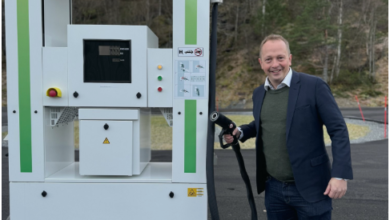Toyota and Kenworth complete ZANZEFF Shore to Store project
The ZANZEFF “Shore to Store” project proved fuel cell electric trucks can match diesel performance.

Toyota Motor North America and Kenworth Truck Company have proven the capabilities of their jointly designed heavy-duty, Class 8 fuel cell electric vehicles (FCEVs) in the Zero- and Near-Zero Emissions Freight Facilities (ZANZEFF) “Shore to Store” project at the Port of Los Angeles, the Los Angeles basin, and the Inland Empire.
The primary goal for Toyota and Kenworth’s participation in the project was to nearly match the performance of diesel-powered drayage trucks while eliminating emissions to provide a sustainable solution in heavy-duty transportation. The baseline for the Toyota-Kenworth T680 FCEV truck – codenamed “Ocean” – was a 2017 diesel engine operating about 200 miles a day. The T680 FCEV has a range of about 300+ miles when fully loaded to 82,000 lbs. (GCWR), and with no downtime between shifts for charging and the short 15- to 20-minute fill time, the FCEVs could run multiple shifts a day and cover up to 400 to 500 miles.
Kenworth designed and built the Class 8 T680 FCEVs, while Toyota designed and built the powertrain’s fuel cell electric power system powered by hydrogen. The Ocean trucks reduced Greenhouse Gases (GHG) by 74.66 metric tons of CO2 per truck annually compared to the baseline diesel engine.
The success of the 10 trucks in serving real-world customers resulted from close collaboration among diverse project members, including Kenworth and Toyota, The Port of Los Angeles as the project lead, Shell for hydrogen fuel infrastructure, and a grant from the California Air Resource Board (CARB).
The program paves the way for further development and commercial opportunities for hydrogen-powered fuel cell electric transportation in California and beyond. Though officially concluding their duties in the ZANZEFF “Shore to Store” project on August 5, 2022, some of the trucks will remain in use as demonstration or working models, including one that will continue supporting Toyota operations in the lower LA Basin.
Although the overall ZANZEFF project is anticipated to conclude later this year, the recently concluded “Shore to Store” project funded under ZANZEFF was proposed with support from Toyota, Kenworth and Shell and funded with a $41 million grant awarded by CARB.
“Shore to Store” provided one of the largest real-world, proof-of-concept test cases to show the practical application of hydrogen-powered fuel cell technology at scale in a framework for freight facilities to structure operations for future goods movement from the “Shore to the Store” in the world.
Port of Los Angeles Executive Director Gene Seroka, said, “We’re grateful to CARB for its generous grant to support this effort and look forward to additional zero emission vehicles operating at the Port of Los Angeles.”
Andrew Lund, Toyota chief engineer, said, “The potential for this technology as a replacement for higher-emission powertrains is real and supports both regulatory and society iniatives to combat climate change while helping us achieve our own goals of carbon neutrality.”
Joe Adams, Kenworth chief engineer, said, “We clearly showed that hydrogen is a viable clean fuel capable of powering commercial transportation for customers, matching diesel performance in range and power, with quick refueling for minimal downtime and smooth, quiet operation.”
Shell contributed to the project by building a total of three hydrogen stations (two ZANZEFF and one additional in the operating region), the first public provider in California to fuel heavy-duty trucks. With the set routes for the trucks’ drayage operations, the stations were regularly used, providing quick refueling to keep the trucks in operation.
Wayne Leighty, Shell Hydrogen Mobility, Commercial Head, North America, said, “Collaborations across both the private and public sectors is key to advancing zero-emissions heavy-duty mobility, and we are grateful to CARB, Port of Los Angeles, and ZANZEFF members for their support.”
